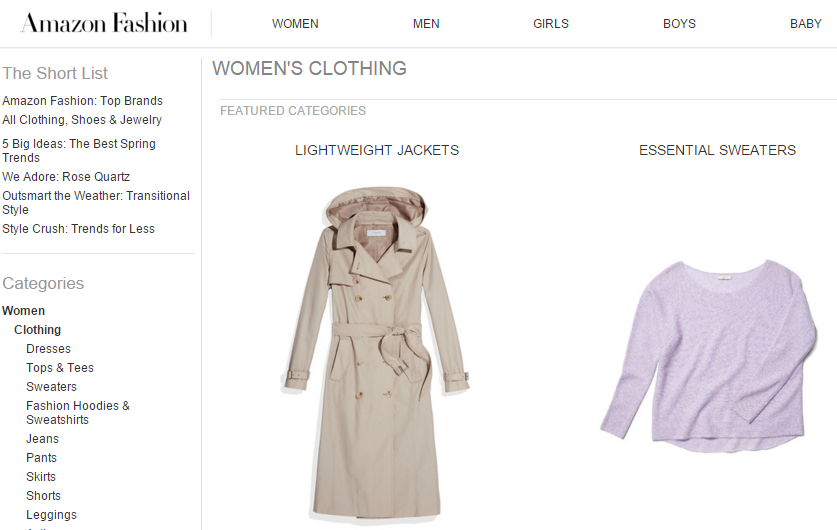Amazon Clothing Line Moving up the Supply Chain

*This article was written by Brian Smyth, Content Writer (Wiser)
 When you think of major fashion brands, most people would think of Kanye West’s Yeezy line before Jeff Bezos’ Amazon.
When you think of major fashion brands, most people would think of Kanye West’s Yeezy line before Jeff Bezos’ Amazon.
Sure, the Marketplace is one of the largest movers of fashion in the world, but they ultimately haven’t ventured into the manufacturing of a private label fashion brand—yet.
Based on news this week, Amazon may soon move up the supply chain and begin manufacturing its own clothing.
The conjecture was formed based off of a combination of job listings on Women’s Wear Daily, and comments the retail giant’s vice president of clothing, Jeff Yurcisin, made last year.
He hinted that Amazon would consider developing their own fashion line in order to fill gaps in current offerings, but why?
Amazon sells over 30 million items of clothing. The unimaginable size begs the question: why would they just now start to sell their own line? The answer can be found in other areas of Amazon’s product assortment. On top of news about a fashion brand, many headlines have hinted at the resurrection of their own diaper brand.
Re/code revealed the news of a survey from a brand called “Mama Bear Diapers”, asking consumers what they look for in diapers. The URL of the survey included “Amazon Elements”, suggesting the company is going back into the diaper business after pulling it last year due to their poor quality.
The combination of their diaper and fashion line means that the company is looking to move up the supply chain and manufacture more private label products.

In 2016, more retailers are developing private label brands than ever, and for a good reason. Margins on private label goods are an average of 10% higher than those on similar branded products.
It also gives them more control of their brand and pricing, especially with the rise of minimum advertised price policies put in place by manufacturers to protect their brand value in the hands of reseller networks.
Plenty of major retailers have begun to turn to private label branding, so what does this mean for those without the resources to take full ownership of their supply chain?
Private label brands are known for competitive prices, and their generic attributes make tracking them for intelligence a difficult task. This is because their universal product code (UPC) is different from national brands.
UPCs are the main attribute retailers use to match products with one another to compare prices and more. How can retailers compete when Amazon grows further into their private label development?
 Amazon has had great reception to private label launches in the past. Just look at the 2009 launch of their AmazonBasics line. Basics allowed them to fully control the brand experience, from manufacturing the product to the packaging it came in.
Amazon has had great reception to private label launches in the past. Just look at the 2009 launch of their AmazonBasics line. Basics allowed them to fully control the brand experience, from manufacturing the product to the packaging it came in.
The retailer could be onto a big opportunity, especially since they helped fuel a 42% increase in consumer packaged goods in 2015.
In the past, private label brands haven’t posed much of a threat to national brands outside of a recession.
But as eCommerce has grown in popularity, and price transparency is at an all time high, things could change.
In retail, national brands are more often than not getting outpriced by their private label counterparts. Luckily, price isn’t always everything when it comes to the shopper’s purchase decision.
Don’t get me wrong, national brands still have pricing power. You can command a higher price for a trusted brand name, the only problem is finding that right price. As Amazon continues its trek into supply chain domination, retailers have to double down on their efforts to collect competitive intelligence.
It feels like every major move the retail behemoth makes is an encroachment on other retailers’ distinctive advantages, but that doesn’t mean they’re set out for pure online retail domination.
The best way for retailers to put up a fight is to make informed decisions with the help of competitive data. Only then can they leverage their own pricing and branding power over Amazon.
